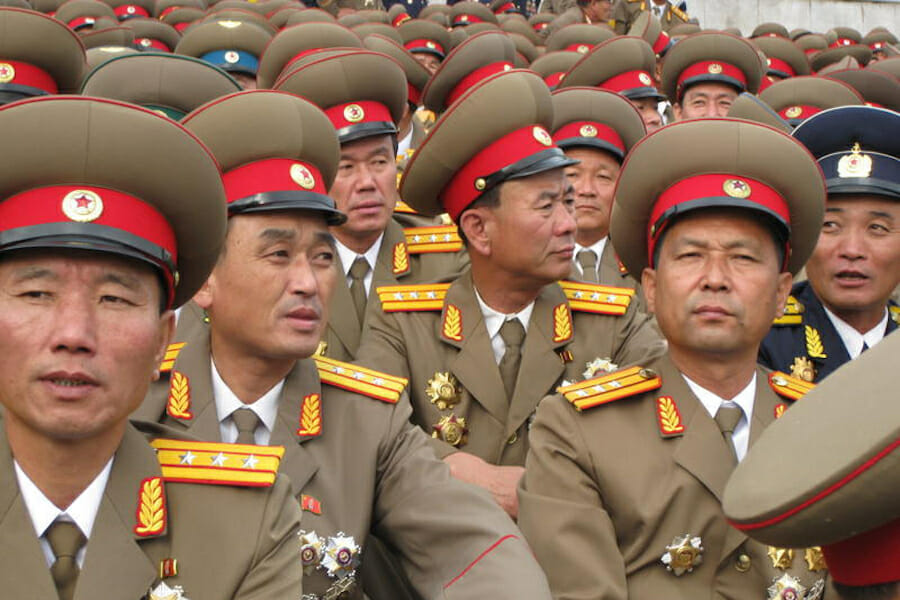
Taking Off the Kid Gloves with Pyongyang
The Korea Times recently published an interesting opinion piece, suggesting the broadening of the Six Party Talks to include the European Union, thus creating “6+EU Talks.” According to the article, this 27-member organization would inject a wider variety of economic and political leverages to the defunct negotiation process.
Which led me to ask: Why not do the opposite and drop the Six Party Talks altogether? What would possibly change in North Korea, its human rights record, its nuclear weapons ambitions, and its shambles of an economy, if the Six Party Talks were dismantled and never to be revisited again? Not much.
Nearly a decade has passed since the negotiations began and none of the intended goals of a non-nuclear and more integrated North Korea have been achieved. If anything, prospects of reaching these objectives are farther than ever.
North Korea has successfully acquired a stockpile of nuclear weapons, has a surprisingly modern weapons facilities, and short missile delivery system supposedly capable of striking Hawaii. Furthermore, North Korea remains unwilling in forfeiting its nuclear capabilities. Especially, as Kim Jong-Il passes the mantle of power to the young heir apparent, Kim Jong-Un, the nuclear weapons program is not only a means of state survival but has become a symbol of the Kim dynasty’s legitimacy.
Failure of Past Leverages
And so as the U.S. and DPRK discuss the restart of talks, perhaps it is time to revisit the goals of the Six Party Talks and whether they are relevant anymore. If there’s anything history has taught us so far, it is that the economic concessions, such as energy or food aid has failed to attract a compliant Pyongyang. Political concessions, such as regime security or removal from the list of states sponsors of terrorism, have also fared a dismal attempt at deterrence. Pyongyang has made it clear on multiple occasions that it would be able to do without the support of the U.S. and its allies. Even after getting slapped by two UN sanctions, the North Korea regime has managed to continue along, relying on its long time ally, China. Especially in recent months, Pyongyang appears to be courting with much success, its traditional allies, Russia and China, for economic partnerships.
The trade volume between the DPRK and China has ballooned to $3.1 billion, a nearly 87% increase from last year’s number. In addition, Beijing has pledged to invest $7.1 billion on expanding the Chinese Dandong port, which sits just north of the North Korean special economic zone city of Rason, in order to “cement [the port’s] role as a transport hub in Northeast Asia that connects the Korean Peninsula with Eurasia.”
As for Russia, Moscow and Pyongyang gave their languishing relations a jolt when Kim Il-sung met with President Medvedev this past August. A number of cooperation agreements were struck, including joint mining projects, joint military exercises, Russia’s leasing of North Korean ports, and the connecting the closed country to the trans-Siberian railway.
The nearly two year hiatus in the multilateral negotiations talks have shown that Pyongyang is still able to survive. And in circumstances of most desperation, it can find alternative sources of support from its allies, without any preconditions of dismantling its nuclear weapons program. However, the tragic irony is that even during the Six Party Talks, the DPRK still managed to score aid and assistance without making any compromises, be it its nuclear ambitions or political or economic reform.
Finding a New Means of Influence
Therefore, before beginning yet another round of talks, the participants of the Six Party Talks should reevaluate the real purpose of the negotiations and to see if it connects to today’s reality. If that means forgoing the Six Party Talks and accepting that North Korea will be a nuclear state, then perhaps it is a bitter pill worth swallowing.
By dealing with North Korea without the kid gloves, where Pyongyang must continually be wooed to come back to the negotiation table, an array of more effective foreign policy tools may become available to the U.S. and its allies. What this means is that the U.S. could unilaterally approach Pyongyang as it does with any troublesome authoritarian government, and provide it with two options: economic engagement with human rights and political reform preconditions or complete disengagement and confinement. This is in contrast to the current Six Party Talks where North Korea is threatened with isolation but simultaneously provided with the assurance of future engagement.
Regarding possible economic engagement, U.S., South Korea, or Japan can investment in major projects like Rason city, Pyongyang’s experiment with capitalism, in return for political or economic reform, though it may be it small and incremental. This sort of proposal is more persuasive than demanding the dismantling of an entire nuclear weapons program, a centerpiece to Pyongyang’s security complex. Furthermore, unlike reneging on the promise of nuclear weapons program cessation, which would just require the removal of seals and expulsion of inspectors, reversing systemic political or economic reform is far more difficult once enacted.
Conversely, by ending the Six Party Talks, this provides the opportunity for parties to disengage North Korea altogether. Most other tyrannical governments in the world are not afforded the luxury of reoccurring multilateral round tables to discuss their bad behavior and how they should be integrated into the world system. And so, the threat of true isolation and denying Pyongyang the occasional “get together” serves as a powerful incentive. Furthermore, with the Six Party Talks gone and no state obligated to negotiate, this would increase pressure on Beijing, who has been slow to push North Korea to reform itself, despite being its largest trading partner. A future without the Six Party Talks is a future where China may end up being the sole supporter of the unpredictable and erratic Pyongyang regime. This is a burden China prefers not to carry alone.
Nevertheless, it appears that the Six Party Talks are slowly gathering steam. Granted it has served for nearly a decade as the means of handling the North Korean question, U.S. policy makers should rethink its capabilities but more important, its limitations.

